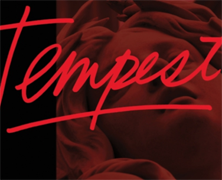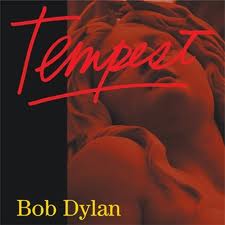A review of Bob Dylan’s new album, Tempest, by Publius. | Are we watching our way of life die? Are we in the middle of a storm? Bob Dylan says “yes” in his latest album. Bob has never been real “happy” in a pop sort of way. A lot of his work is about what is wrong with us. But this is his darkest album out of all 35 in my opinion. I still think it will garner him some awards at the Grammy’s this Sunday. And despite what others might think, the awards will be deserved, not just more lovin’ on ol’ Bob.
About to turn 72, Bob still has something to say for anyone willing to listen, even fifty years after his first album came out. I am always amazed at his staying power. And the power is in the words. His voice is so grumbly these days you have to adjust your bass levels to hear him, and the tunes continue to come from other places, but the words are his and his alone. And when you listen, his words become the words by which you better understand your own life. If you have not heard anything from this album, you should consider giving it some time.
In the opening, with the light and trippy Duquesne Whistle, Bob has us off and running through the whole gamut of human emotions. We ride a train with snapshots of life flashing by our eyes as we listen “to that Duquesne whistle blowin’, like she’s never to blow again.” We jump off the train into a quiet place where Bob is singing the praises of true love even while lamenting its counterfeit Soon After Midnight where his day is just beginning. The ‘hook up’ culture should take a close listen.
Many like to guess at where Bob is these days religiously. Narrow Way may be a partial reply to those who wish to listen. He seems to understand that man cannot work his way up to God, but rather that God must come to us, where we are, in all our broken misery. He borrows a great chorus (that gets buried in your brain all day long) from the Mississippi Sheiks’ 1934 blues “You’ll Work Down to Me Someday.” On the heels of gospel/blues comes another consideration of lost love: Long and Wasted Years is one of the shorter pieces on an album of lengthy numbers (five of the ten tracks exceed seven minutes in length). Loss pours out the chords of this piece, leading us right into the contemplation of Pay in Blood, where Bob sends us to consider some of his best lyrics of the album.
Low cards are what I’ve got
But I’ll play this hand whether I like it or not
I’m sworn to uphold the laws of God
You could put me out in front of a firing squad
I’ve been out and around with the rising men
Just like you my handsome friend
My head’s so hard, must be made of stone
I pay in blood, but not my own
But, lest we get too low, Dylan invites us to visit him in his hometown: Scarlet Town. The plodding tune tells us all about the sights you can see in this red town of sin and beauty, many of the images being pulled from verses by 19th-century Quaker poet and abolitionist John Greenleaf Whittier. We all know there are uncanny resemblances between modern America and the ancient Roman empire. Bob calls on us to consider some of those likenesses in Early Roman Kings. Another lengthy contemplation of love, this time in a tragic love story, Tin Angel leads us right into the title track: Tempest. Tempest sports forty-five verses with no chorus on the sinking of the Titanic, set to an Irish melody with accordion and fiddle (Bob is having fun now!). One more lengthy piece on John Lennon (Roll On John) end out the set list.
You feel exhausted but filled with wonder when you are done. In a culture of pop and pabulum, it is nice to see someone like Bob hold to the things that are worth writing about, and worth spending sufficient time. Music should do more than tickle the ear; it should on occasion bring us to think deeply about life and how we live it. Some fans of Bob are making much of the title, “The Tempest” being the same title of William Shakespeare’s last play. Maybe Bob is done, or maybe there is more. Whatever may yet come, here is some great moments for the journey. I highly recommend you spend some time with Bob’s Tempest.



